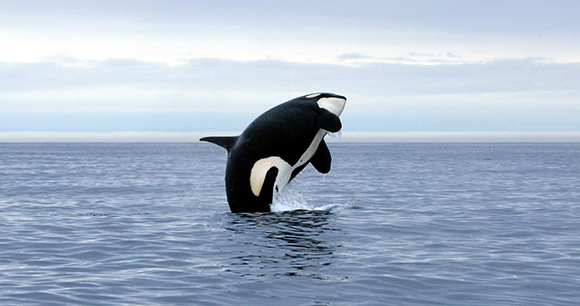
Action Needed Now to Address Whales' Declining Health
Washington, DC—Today, a group of prominent marine mammal biologists from across the globe, including Dr. Naomi Rose of the Animal Welfare Institute (AWI), sent a second letter requesting that Russia release the remaining 80+ beluga whales and 10 orcas held in the “whale jail” in Russia’s Far East and to stop capturing orcas and belugas in the Sea of Okhotsk for sale to marine parks in Russia and abroad.
In a letter delivered today to the office of Russian President Vladimir Putin, 34 scientists requested that the Russian government allow a team of Russian and international experts to evaluate and treat the whales held in poor conditions in enclosures in Srednyaya Bay near the port town of Nakhodka. The letter includes documentation, prepared by biologists and veterinarians, of the rapidly deteriorating health of at least one orca held in a small enclosure with other young individuals.
“Additionally, one orca and several [beluga] whales are reportedly missing, and although the captors claim these animals escaped the pens, given their young ages and poor condition, we are concerned that they may have actually died,” the letter states.
According to recent media reports, Russian officials have charged four companies for originally confining 90 belugas and 11 orcas to tiny, crowded enclosures, dubbed “whale jails” by local activists, off Russia’s Pacific coast. It is believed that many of the belugas and all of the orcas, kept in pens since the summer, were intended to be sold to Chinese aquariums, with some of the belugas going to Russian facilities.
Following months of public outrage and appeals from celebrities, Putin ordered an evaluation of all options, including releasing the animals, yet there has been no significant change in their circumstances to date.
Given the length of time the whales have suffered in these enclosures, the scientists’ letter urged that the pens be expanded in size and that water quality and circulation be improved. They also stressed the importance of returning these animals to their birth populations after appropriate rehabilitation.
Captures are highly stressful to whales and dolphins, leading to injuries, deaths, fractured social networks within pods and potential long-term population declines that could significantly harm a population’s conservation status.
“We are grateful to the Russian authorities, including President Putin, for the consideration they have shown toward these suffering whales,” said Dr. Rose. “Science suggests that these young animals can expect to have a good chance of success if they are released to their birth populations, where they can learn from familiar adults how to survive in the wild. We hope that the Russian government will soon take these steps to achieve this goal.”
It is illegal in Russia to capture cetaceans except for scientific and educational purposes; the companies that captured these whales claimed an educational purpose. Belugas are worth tens of thousands of dollars to marine parks in China, while orcas are worth millions.
Several countries have passed domestic laws banning live captures of cetaceans in their waters, as well as imports and exports. International wildlife law, however, does not prohibit such captures, and only requires that the live cetacean trade be monitored.
Margie Fishman, (202) 446-2128, [email protected]